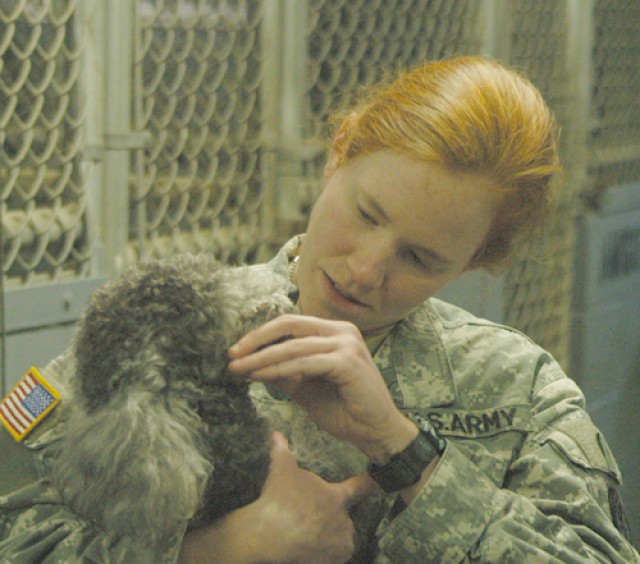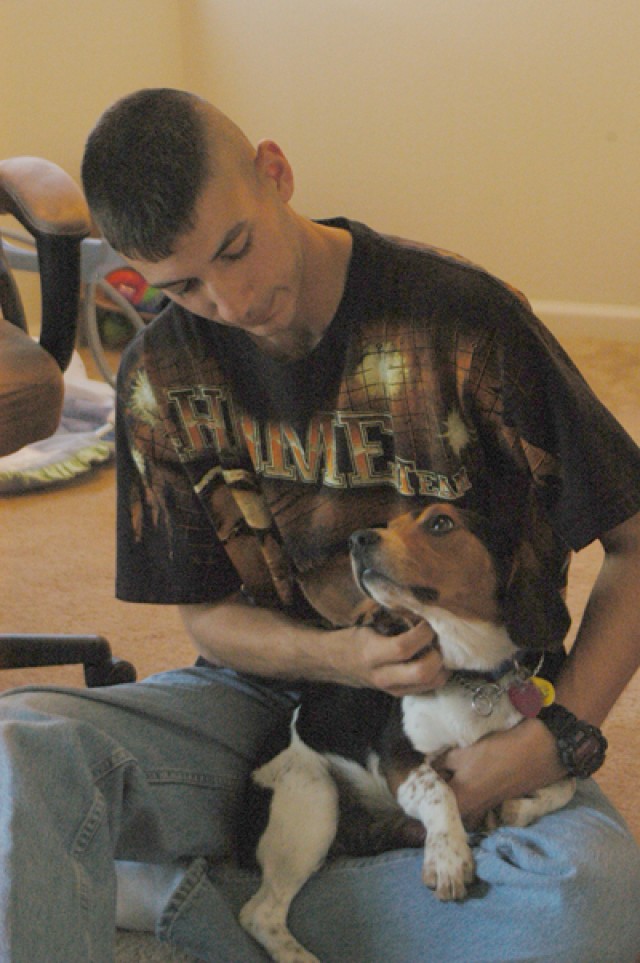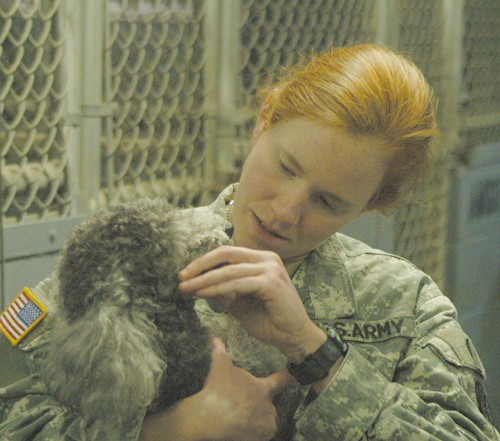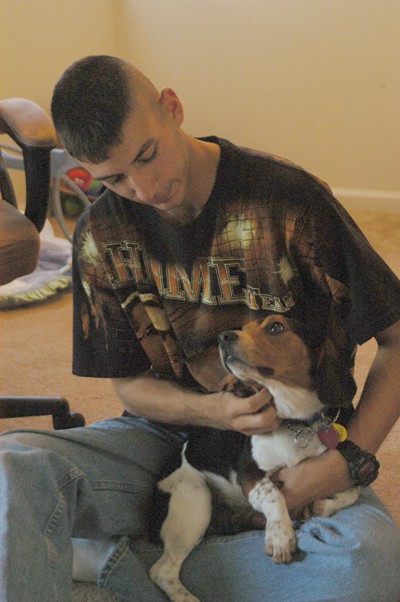Rabid dogs roam the streets, house cats form prides, weeds grow knee high on Georgia Avenue. Soldiers vainly attempt to conduct physical training. Mothers keep their children locked in their houses. Cars slam into each other -- traffic is a total meltdown. Who knows what chaos might ensue were it not for Fort Polk's stray animal program.
The program has moved to the military working dog kennel on La. Hwy 10. The move was made to accommodate Army requirements for the housing of MWDs. The dogs of the 91st Military Police Detachment, 519th Military Police Battalion, formerly housed at the kennel, have moved into the stray animal facility at the Fort Polk Veterinary Facility. Prior to the move, the 91st had outgrown its kennel, and three of its MWDs were in outdoor pens. The detachment negotiated a swap with the vet clinic to get their dogs out of the elements. "MWDs have saved the lives of countless Soldiers," said Capt. Erika Stapp, Fort Polk veterinarian. "We treat them like we would treat any Soldier."
However stray animals exceeded the capacity of the MWD kennel. When the move took place it was necessary to find homes for some. Soldiers of the 91st took it upon themselves to remedy the situation. "My handlers adopted a majority of the dogs and a couple of the cats," said Capt. Melissa La Plante, rear detachment commander, 519th MP Bn. "This whole move epitomizes our relationship. We came up with a course of action that would work out for both agencies. Everyone has worked together to make it happen, and ensure that both the strays and the MWDs are well taken care of."
"The 91st has gone above and beyond what could be expected, and have been superb to work with," said Stapp. "They have been a tremendous help through all of this, getting all of our equipment moved out there and their equipment moved in here."
Spc. Charles Nelson, 91st MP Det, adopted one of the dogs. "Rowdy," a 7 month old beagle/bassett mix, has adjusted well to his new home. "The first couple of nights he was scared," said Nelson, "but he loves it here. He's got a lot of toys and plays with my son all day long." Nelson's son CJ, 1, was ecstatic from the moment Rowdy joined the family. "He loves that dog," said Nelson.
Nelson was more than happy to give Rowdy a home. "I thought it was a great idea," he said. "I was raised around dogs and cats all my life. The worst thing to see is a little puppy, especially one as young as he is, without a home."
In the six months that Stapp has served as the Fort Polk veterinarian, she has not had to euthanize any healthy animals. "My employees and I will do everything we can to get them adopted rather than have to put them down. It breaks my heart to euthanize an animal."
If the kennel is overcrowded and the animals are not adopted, Stapp works with off-post shelters to find homes for them.
The current facility for the stray animals is limited, and a steady rate of adoptions is imperative to maintain capacity for new residents.
Fort Polk Game Management is responsible for apprehending stray animals. According to Elton Herring, Fort Polk game warden, the department rounded up 15 stray animals in December. About 15 more were pets which were returned to their families. "As spring approaches, and things begin to warm up, the number of stray animals will increase," said Herring.
"If more people adopt, we'll have more room to accept animals," said Stapp.
Fort Polk's regulations provide Families the opportunity to keep pets. Nelson said pets improve the quality of life for Soldiers and their Families. "The post has rules to protect other families that are either afraid of dogs or nervous around them," he said. "The procedures that they have for microchipping and making sure all the dogs are vaccinated when they leave the vet's office makes the whole neighborhood safe, and more family oriented."
The stray animal program serves as population control. "Without the program there would be dogs and cats running loose," said Stapp. "Pretty soon you would have wild dogs and cats, and those animals serve as a reservoir for disease. The most common disease is rabies, but there are others that can be dangerous for humans. The stray animal facility helps control that by catching the pets before they have a litter in the wild." The program also lessens another danger -- wild animals are more prone to bite. "We monitor the animals for aggressive tendencies," said Stapp. "If they exhibit any aggressiveness that we think is an issue, I won't take a chance on adopting them to anyone." All of the animals up for adoption are family friendly.
Anyone can adopt a pet from the stray animal program. To adopt, interested parties must fill out a registration packet, pay for vaccines, a microchip (mandatory for on-post pets) and a heartworm test. Adoption includes an optional free spay or neuter.
The stray animal program only accepts new animals from Fort Polk Soldiers with valid reasons for leaving their pets, subject to approval by the veterinarian.
The stray animal facility is currently located in bldg 3072 on La. Hwy 10. Call 531-1322 for directions. Facility hours are Monday through Friday from 9 a.m. to 12:30 p.m. and 1 to 3 p.m. and Saturday and Sunday from 9 a.m. to noon.




Social Sharing